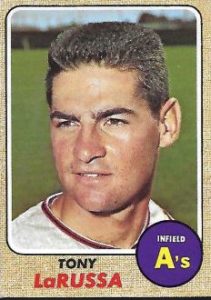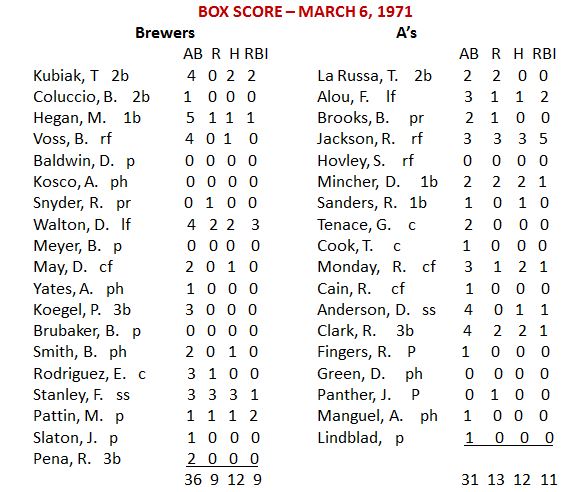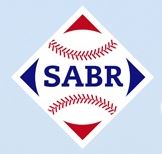How about another Spring Training memory – this one a dream for hitters and a nightmare for pitchers? Today (March 9) marks the 48th anniversary of a Charley Finley-Joe Cronin production known as the “three-ball walk.”
Oakland A’s owner Charlie Finley was, of course, a bit of a maverick – with all kinds of ideas for changing the game. He pioneered colorful uniforms (when the practice was white at home, grey on the road); and lobbied (ahead of his time) for inter-league play, the designated hitter (he was also in favor of designated runners); and post-season night games.
He also thought an “Alert Orange” baseball might be easier for fans to track and that a three-ball walk might add some excitement (and offense to the game). And, that brings us to March 7, 1971, with the Brewers facing Finley’s A’s in a Spring Training match-up. Finley was successful in getting then AL President Joe Cronin to approve using the “three-ball walk” for that contest. The results were less than impressive – and the experiment was not tried again. Oh, there was more offense. The A’s won 13-9, but the game also featured 19 walks. (Perhaps Spring Training – when pitchers are still working out “command” issues – was not the best time to try out a three-ball walk.
With pitchers focused on the “short counts,” the game also featured five home runs, including two (one a Grand slam) by Reggie Jackson. (See the box score below for details.) Poor Jim Slaton, a rookie with the Brewers that season, lasted just 1 2/3 innings – giving up six runs on two hits and eight walks (no strikeouts). The 21-year-old would go on to a 10-8, 3.78 record for the Brewers in the regular season – and would win 151 games (158 losses) in 16 MLB campaigns. By the way, nobody took greater advantage of the three-ball walk than Oakland lead off hitter and second baseman Tony La Russa – who drew four walks in the contest. During the 1971 regular season, La Russa would draw one walk in 32 games (only 16 plate appearances).
Notably, considering the shape of today’s game, the 19-walk, 24-hit, 19-run, seven-pitch, 37-player contest was completed in two hours and 41 minutes.
_________________________________________
______________________________________________________
EVOLUTION OF BASEBALL’S WALK RULE
1879 – Nine “called balls” to achieve a walk; walks do not count as a time at bat.
1880 – Eight balls to achieve a free pass.
1884 – Six balls for a walk.
1887 – Five balls for a walk; bases on ball counted as hits and a time at bat (this season only).
1889 – Four balls for a walk.
1971 – Three ball for a walk approved for one American League Spring Training game.
Primary Resources: Rule Great For Reggie, by Ron Bergman, Oakland Tribune, March 7, 1971; Baseball-Reference.com; Baseball-Almanac.com.
BASEBALL ROUNDTABLE ON THE TOP 100 BASEBALL BLOG LIST
 Baseball Roundtable is on the Feedspot list of the Top 1oo Baseball Blogs. To see the full list, click here.
Baseball Roundtable is on the Feedspot list of the Top 1oo Baseball Blogs. To see the full list, click here.
I tweet baseball @DavidBBRT
Follow/Like Baseball Roundtable’s Facebook Page here. More baseball commentary; blog post notifications; PRIZES.
Member: Society for American Baseball Research (SABR); The Baseball Reliquary; The Negro Leagues Baseball Museum.










